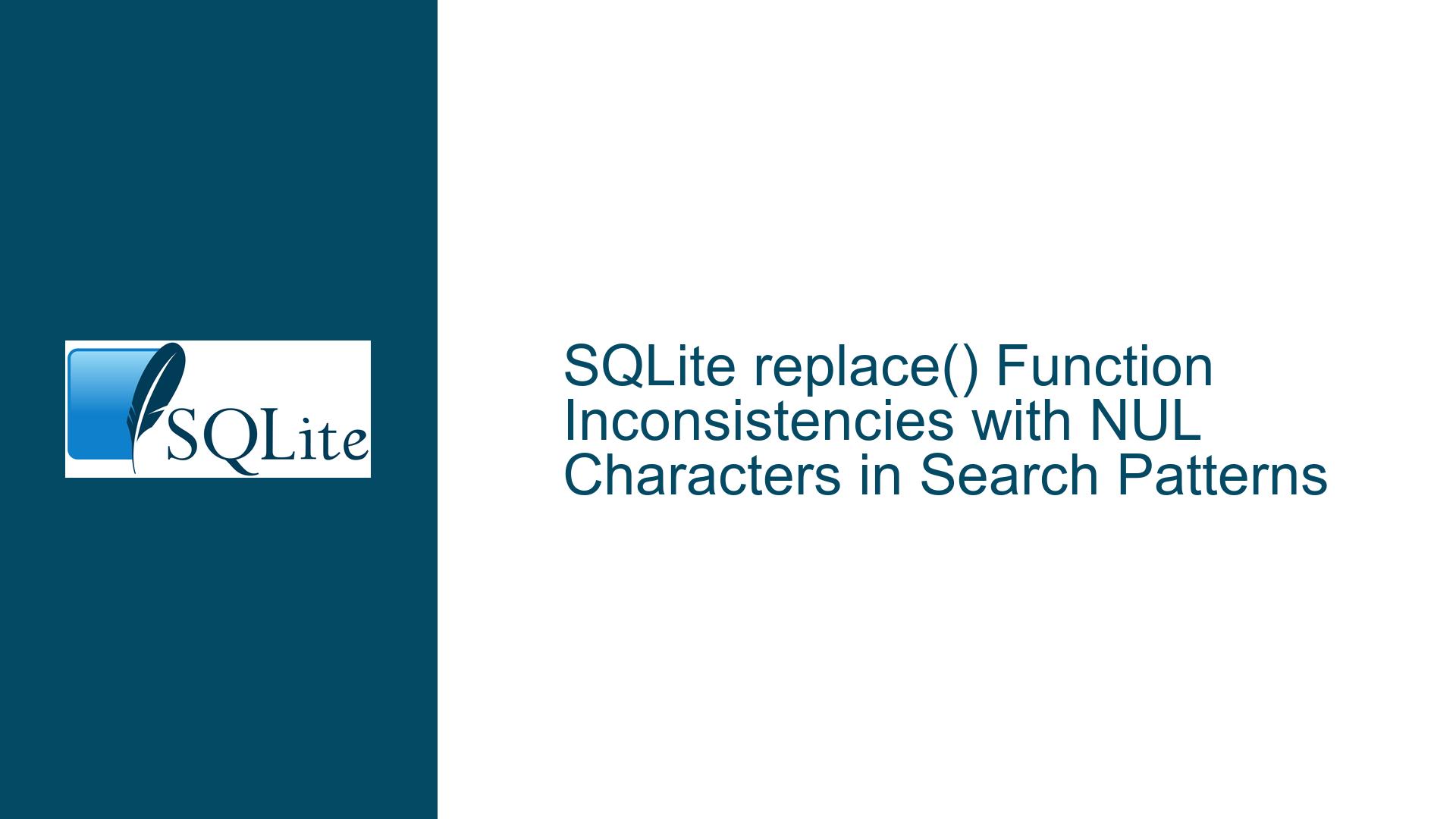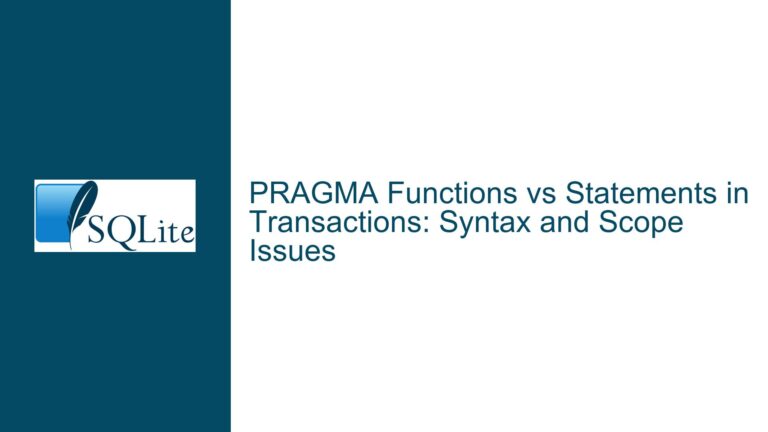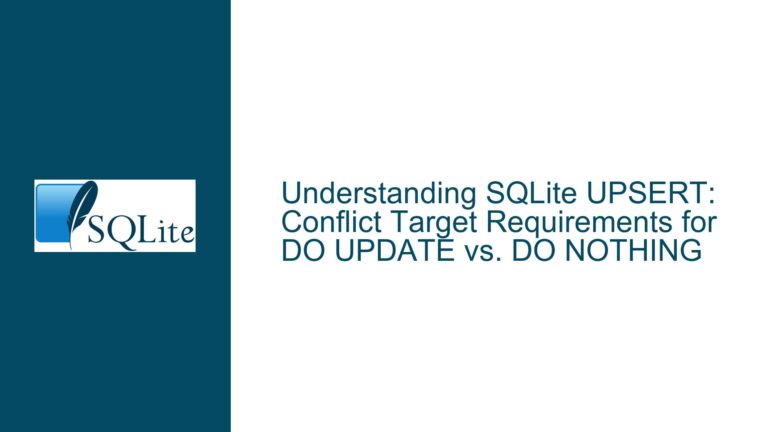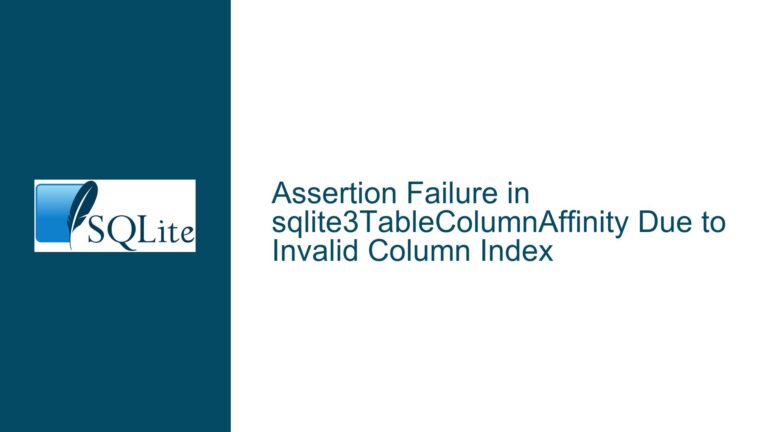SQLite replace() Function Inconsistencies with NUL Characters in Search Patterns
Issue Overview: replace() Function Fails When Search Pattern Contains Leading NUL
The SQLite replace(X,Y,Z) function exhibits unexpected behavior when the search pattern (Y parameter) contains NUL (0x00) characters. This manifests most prominently when the Y argument begins with a NUL character or contains NULs in non-terminal positions. The function may incorrectly treat the search pattern as an empty string or fail to match patterns containing embedded NULs, despite SQLite’s documented capability to handle BLOB data with arbitrary bytes.
At the core of this issue lies a conflict between SQLite’s string handling semantics and its binary data capabilities. While SQLite supports both TEXT and BLOB types that can contain NUL characters, several string functions exhibit undefined behavior when processing TEXT values with embedded NULs. The replace() function demonstrates particularly problematic behavior due to its dual-purpose implementation that makes implicit assumptions about NUL termination.
The problem becomes apparent in three distinct scenarios demonstrated by the test case:
Leading NUL in Search Pattern
When Y starts with a NUL character followed by other content (e.g., X’0001′),replace()fails to recognize the full pattern, instead behaving as if Y were empty. This occurs because the implementation checks for empty patterns by examining the first character rather than considering the pattern’s actual length.Mid-Pattern NUL Handling
Patterns containing NUL characters not at the start (e.g., ‘A’||X’00’||’B’) may cause premature termination of pattern matching operations due to C-style string handling in internal implementations.Type Coercion Inconsistencies
The function demonstrates different behavior when arguments are explicitly cast as BLOBs versus when they’re treated as TEXT values, despite SQLite’s type affinity system. This reveals deeper issues in argument processing logic.
The test case demonstrates these issues through hexadecimal comparisons of actual versus expected results. A correct implementation should produce three TRUE values (1|1|1), but the current behavior returns 1|0|0, showing failures in two of three test conditions. This inconsistency persists across both TEXT and BLOB representations of the data, though with different failure modes depending on type handling.
Possible Causes: String Termination Assumptions vs. BLOB Semantics
1. C-Style String Handling in Function Implementation
SQLite’s internal implementation of the replace() function makes implicit assumptions about NUL termination inherited from its C-language roots. The problematic code path checks for empty search patterns using:
if( zPattern[0]==0 ){ ... }
This C-string idiom incorrectly treats any pattern starting with NUL as empty, ignoring the actual length parameter stored with SQLite’s text values. The correct check should use the explicit length parameter:
nPattern = sqlite3_value_bytes(argv[1]);
if( nPattern==0 ){ ... }
This mismatch between C-string semantics and SQLite’s internal string storage (which tracks lengths separately) causes premature termination of pattern processing when the first character is NUL.
2. Inconsistent Type Handling Between TEXT and BLOB
SQLite’s type affinity system creates hidden edge cases when dealing with NUL-containing values:
- TEXT Values: Treated as NUL-terminated strings in C API interactions, causing embedded NULs to truncate values at the byte level
- BLOB Values: Treated as raw binary data with explicit length, preserving all bytes including NULs
The replace() function shows different failure modes depending on whether arguments are cast as BLOBs:
-- TEXT handling fails mid-pattern NUL matching
SELECT replace('0'||x'00'||'1', x'00', '_'); -- Returns '0_1' (correct)
SELECT replace('0'||x'00'||'1', '0'||x'00', '_'); -- Returns '_1' (correct)
SELECT replace('0'||x'00'||'1', x'00'||'1', '_'); -- Returns '0_' (correct)
-- BLOB handling preserves NULs but reveals other issues
SELECT hex(replace(cast('0'||x'00'||'1' as BLOB), cast(x'00'||'1' as BLOB), '_'));
-- Returns 305F instead of expected 305F (hex for '0_')
These inconsistencies stem from:
- Automatic type conversion between BLOB and TEXT
- Different memory comparison strategies for different types
- Collation sequence application to TEXT but not BLOB
3. Undefined Behavior Documentation vs. Actual Implementation
SQLite’s documentation explicitly states that operations on TEXT values with embedded NULs yield undefined results. However, several factors make this problematic:
Function-Specific Variations
Some functions likeinstr()andsubstr()handle NULs predictably when using BLOB arguments, whilereplace()shows inconsistent behavior even with BLOBsImplicit Type Conversions
SQL expressions likex'00'||'1'produce TEXT values by default, subject to NUL truncation, while users might expect BLOB-like behavior from hex literalsAPI Contract Violations
When usingsqlite3_bind_text()with embedded NULs, the documentation warns about undefined behavior, but thereplace()function’s behavior crosses from "undefined" to "logically inconsistent" when comparing BLOB vs TEXT handling
4. Pattern Matching Algorithm Limitations
The current implementation uses a naive search-and-replace algorithm that makes multiple passes through the input string. Key limitations include:
memcmp() Usage
Whilememcmp()allows binary pattern matching, the initial empty-pattern check bypasses proper length validationOverlap Handling
The algorithm doesn’t properly account for NUL characters when determining pattern overlaps in replacement operationsEncoding Assumptions
The implementation assumes all characters are single-byte when calculating offsets, causing misalignment with multi-byte encodings (though UTF-8 handling isn’t directly related to the NUL issue)
Troubleshooting Steps & Solutions: Ensuring Consistent NUL Handling
1. Validate Current Environment Behavior
Before attempting fixes, confirm the specific failure mode in your environment:
Step 1: Test Basic NUL Handling
SELECT
hex(replace(x'000102', x'00', x'AA')) as repl1,
hex(replace(x'000102', x'0001', x'AA')) as repl2,
hex(replace(x'000102', x'0102', x'AA')) as repl3;
Expected Result (Proper BLOB Handling):
AA0102|AA02|00AA
Actual Result in 3.39.4:
AA0102|AA02|00AA (Correct for BLOBs)
Step 2: Test TEXT vs BLOB Differences
SELECT
hex(replace('a'||x'00'||'b', x'00', 'c')) as text_handling,
hex(replace(cast('a'||x'00'||'b' as BLOB), x'00', 'c')) as blob_handling;
Expected Result:
616362|616362
Actual Result:
61 (TEXT gets truncated at NUL) | 616362 (BLOB handled correctly)
2. Apply Targeted Workarounds
Workaround 1: Explicit BLOB Casting
Force all arguments to BLOB type to bypass TEXT handling issues:
SELECT hex(replace(
cast(X as BLOB),
cast(Y as BLOB),
cast(Z as BLOB)
));
Workaround 2: Custom Replacement Function
Create a user-defined function for NUL-safe replacements:
#include <sqlite3ext.h>
SQLITE_EXTENSION_INIT1
static void nul_safe_replace(
sqlite3_context *context,
int argc,
sqlite3_value **argv
){
const unsigned char *x = sqlite3_value_blob(argv[0]);
int x_len = sqlite3_value_bytes(argv[0]);
const unsigned char *y = sqlite3_value_blob(argv[1]);
int y_len = sqlite3_value_bytes(argv[1]);
const unsigned char *z = sqlite3_value_blob(argv[2]);
int z_len = sqlite3_value_bytes(argv[2]);
unsigned char *result = sqlite3_malloc(x_len + (x_len/y_len + 1)*z_len);
// ... (Implement BLOB-safe replacement logic)
sqlite3_result_blob(context, result, result_len, sqlite3_free);
}
int sqlite3_extension_init(
sqlite3 *db,
char **pzErrMsg,
const sqlite3_api_routines *pApi
){
SQLITE_EXTENSION_INIT2(pApi);
sqlite3_create_function(db, "nul_replace", 3, SQLITE_UTF8|SQLITE_INNOCUOUS,
0, nul_safe_replace, 0, 0);
return SQLITE_OK;
}
Workaround 3: Preprocess NUL Characters
Remove NULs before replacement operations:
-- Using nested replace for multiple NULs
UPDATE table SET column = replace(cast(column as BLOB), x'00', x'');
3. Apply Source Code Patches
For users compiling SQLite from source, apply the discussed patch to fix the empty pattern check:
Modified func.c (Lines 1267-1278):
- if( zPattern[0]==0 ){
+ nPattern = sqlite3_value_bytes(argv[1]);
+ if( nPattern==0 ){
assert( sqlite3_value_type(argv[1])!=SQLITE_NULL );
sqlite3_result_value(context, argv[0]);
return;
}
- nPattern = sqlite3_value_bytes(argv[1]);
Rebuild Steps:
- Download SQLite amalgamation source
- Apply patch to
src/func.c - Recompile with:
gcc -DSQLITE_ENABLE_UPDATE_DELETE_LIMIT -O2 \
-o sqlite3 sqlite3.c shell.c -lpthread -ldl
4. Implement Comprehensive Testing Strategy
Develop test cases covering NUL scenarios:
Test Table Creation:
CREATE TABLE test_nul (
id INTEGER PRIMARY KEY,
content BLOB,
description TEXT
);
INSERT INTO test_nul (content, description) VALUES
(x'000102', 'Leading NUL'),
(x'010002', 'Mid NUL'),
(x'010200', 'Trailing NUL'),
(x'000000', 'All NULs');
Automated Test Script:
import sqlite3
import binascii
def test_replacement(conn, pattern, replacement):
cursor = conn.cursor()
cursor.execute("SELECT id, content FROM test_nul")
for row in cursor.fetchall():
id, content = row
hex_content = binascii.hexlify(content).decode()
cursor.execute(
"SELECT hex(replace(?, ?, ?))",
(content, pattern, replacement)
)
result = cursor.fetchone()[0]
expected = hex_content.replace(
binascii.hexlify(pattern).decode(),
binascii.hexlify(replacement).decode()
)
assert result == expected, f"Failed on {hex_content}"
5. Adopt Defensive Programming Practices
Explicit Type Specification
Always cast values when working with binary data:-- Instead of: SELECT replace(x'00', '00', 'FF'); -- Use: SELECT replace(cast(x'00' as BLOB), cast(x'00' as BLOB), cast(x'FF' as BLOB));NUL Sanitization
Remove NULs at input boundaries:CREATE TRIGGER sanitize_input BEFORE INSERT ON user_data BEGIN SET NEW.content = replace(cast(NEW.content as BLOB), x'00', x''); END;Function Selection
Preferhex()/unhex()for binary handling:SELECT hex( replace( unhex('000102'), unhex('00'), unhex('FF') ) );Version-Specific Workarounds
Implement conditional SQL based on SQLite version:SELECT CASE WHEN sqlite_version() < '3.40.0' THEN replace(cast(X as BLOB), cast(Y as BLOB), cast(Z as BLOB)) ELSE replace(X, Y, Z) END;
6. Monitor Future SQLite Updates
Track these development areas for permanent fixes:
SQLite GitHub Issues
Monitor SQLite’s fossil repository for changes tofunc.cDocumentation Updates
Watch for clarifications in Core Functions DocumentationBinary Handling Improvements
Follow proposals for enhanced BLOB function support like SQLite’s BLOB enhancement proposals
By combining immediate workarounds with long-term monitoring and defensive coding practices, developers can mitigate the risks associated with NUL handling in SQLite’s replace() function while awaiting permanent fixes in future releases. The key lies in strict type management, comprehensive testing, and understanding the interaction between SQLite’s C-language heritage and its SQL interface semantics.






